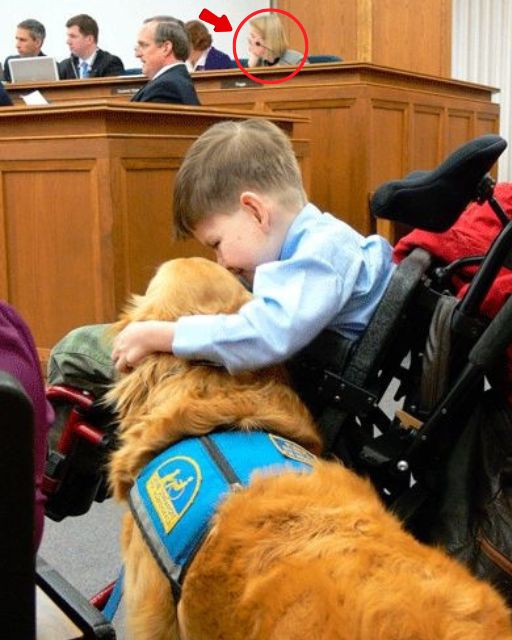I walked into the city-council chamber expecting nothing more than polite clapping and a line on the budget sheet. My son Nolan, eleven, moved beside me in the quiet shuffle he’s perfected—eyes down, one hand buried in the golden ruff of Hunter, his service dog. I wasn’t there to speak; I was background noise, a warm body tallying support for a program that helps families afford trained dogs like Hunter. We took seats near the back, the fluorescent lights humming louder than the crowd.
Nolan doesn’t do public. Autism keeps his words tucked in a vault that opens only for family, and even then sparingly. Hunter is the key: when anxiety spikes, the dog leans, Nolan breathes, the vault cracks. That morning the room smelled of coffee and floor wax—too clean, too bright. I felt Nolan’s elbow twitch and watched Hunter press sixty pounds of calm against his leg. Good sign. We’d last ten minutes, maybe fifteen.
Then the agenda shifted. A council member pointed to the “additional public comment” line and said, “Since we have service-animal advocates here, let’s hear from them.” Thirty faces spun toward us. My pulse leapt; Nolan’s world narrowed to the tile pattern. I stood, intending the usual thank-you-and-please-fund speech. Instead, Nolan rose too—shaky, but upright. Hunter padded forward until the leash was taut, anchoring him. The room went library-still.
Nolan’s mouth opened. Closed. Opened again. One syllable eked out—“Hunter.” It wasn’t loud, but it landed like a gavel. Phones lowered. A baby stopped fussing. He tried again, this time stringing four words together: “He… talks… when… I… can’t.” His voice cracked on the last consonant, yet it was the longest sentence I’d heard him utter outside our kitchen. I rested a hand on his shoulder; Hunter tucked his head under Nolan’s palm, a living teleprompter.
I told the council the rest—how the dog costs more than my car, how insurance calls it “optional,” how one meltdown averted in a parking lot is worth every donated dime. But the speech wasn’t mine anymore. Nolan interjected, halting, but unstoppable: “Hunter keeps the lights from screaming.” The phrase didn’t make clinical sense, but every parent of a sensory kid in the room nodded. When he finished, there was no polite pause—there was immediate applause, the standing kind, the sort that rattles windows.
A local reporter cornered us afterward. Nolan let Hunter sit on his feet while he answered—yes, no, maybe—three whole sentences before retreating into my shadow. The story ran online that afternoon. By evening, the clip had looped past a hundred-thousand views. Comments piled up: “That’s exactly how my son describes noise.” “My daughter says colors shout.” Strangers emailed: “How do we donate?” “Where do we apply?”
Within a week the council doubled the program’s funding. A tech company offered to sponsor ten additional dogs. The elementary school asked Hunter to do a “meet-and-greet” therapy day. None of it was on my bingo card when I buttoned Nolan’s shirt that morning.
Best of all, something shifted inside him. He still speaks in rationed syllables, but he knows his voice can travel from tile floor to voted budget. He knows people listened. And I know this: advocacy isn’t always a prepared statement; sometimes it’s a boy, a dog, and a room willing to wait for the next word.
